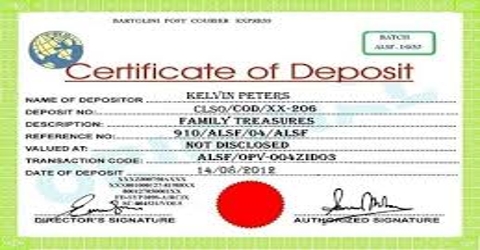Certificate of deposit (CD) is a type of savings tool that can offer a high return on your money than most usual savings accounts. CD is unsecured, negotiable, short-term instruments in bearer form, issued by commercial banks and growth financial institutions. They can be issued to individuals, corporations and companies during periods of tight liquidity when the deposit growth of banks is slow but the demand for credit is high. They help to assemble a large amount of money for short periods.
Advantages
Certificate of Deposit is particularly helpful for a risk-averse investor who is looking to save and will not need funds until the instrument reaches maturity.
- An excellent short- to medium-term investment,
- A higher rate of return than traditional money market accounts
Disadvantages are:
- Investors can redeem bank-issued CDs prior to maturity. However, you will typically be charged an early withdrawal penalty.
- CDs are fully taxable at the state, local and federal levels.
- The investment is locked in at a specific rate, even if interest rates increase.















